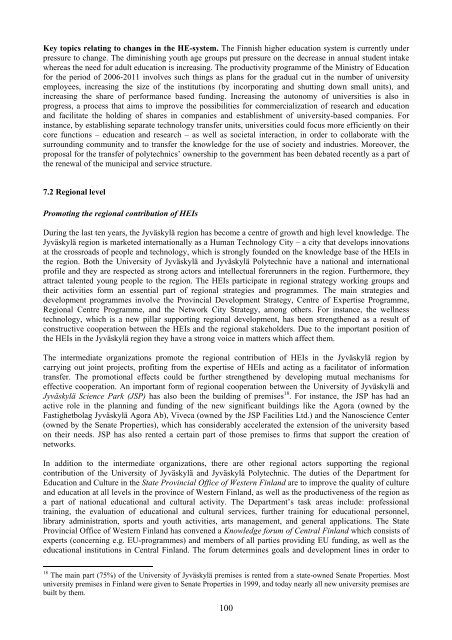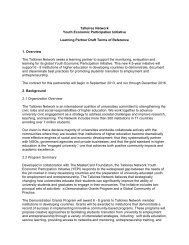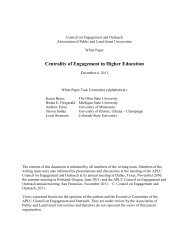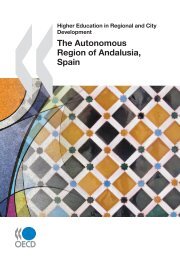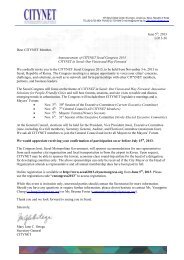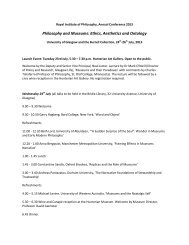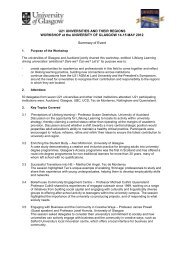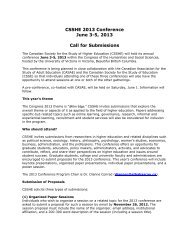development of sub-regional cooperation by bringing together, in a joint network, municipalities, HEIs,research units and enterprises. The assumption is that urban regions are considered to be functional entitiesfor development, for which the core city and the surrounding municipalities must cooperate closely. Both theCentre of Expertise Programme and the <strong>Region</strong>al Centre Programme are based on regional/local inspirations,forming the “bottom approach”, in contrast to the “top down” national system. The EU programmes andstructural funds promote the regional dialogue and, along with the new programming period, thecollaboration will become increasingly important.Hence, the coordination of the contribution of HEIs to regional development is a complex system. However,the importance of HEIs in regional development is stressed by all parties involved in the national system andthe knowledge they produce is seen as an outstanding source of competitiveness.Budget based incentives. Furthermore, the actual operations of HEIs are strongly dependent on the budgetconstraints set by the national budget instalments and sources of regional finance. In the annual performancenegotiations, the Ministry of Education and each HEI agree on the targets for their operations, the resourcesneeded, monitoring and assessment of target achievement and further development, and confirm three-yearagreements on these. The Ministry also gives a written feedback document to each university on how wellthe targets set in previous negotiation have been achieved. The feedback concentrates on strategic issues and,if possible, suggests development proposals. The financing of the operational expenditure of the universities,allocated through the Ministry of Education, comprises the core funding, project and performance-basedfunding, and the national funding also. Besides education and research, the core funding formula takes thesocietal service mission into account. Performance-based funds are used to reward the quality and societaland regional impact made. The different components of the Ministry of Education’s funding for theUniversity of Jyväskylä are represented in Appendix 16. In addition to the core funding, the polytechnics’funding consists of project and performance-based funding as well as substantial external financing. Thepolytechnics chosen as high-quality units of education or regional contribution receive performance-basedappropriation. As a whole, the regional contribution is only one part of the performance-based funding ofHEIs and the amount of funding addressing the regional contribution is rather small when compared to thebasic funding streams. Hence, the budget based incentives for the regional activities of HEIs are not veryefficient.Reviewing and evaluating the impact of HEIs on regional development<strong>Evaluation</strong> and monitoring focusing on HEIs. The evaluation of regional engagement is a multi-facetedsystem carried out by different actors. HEIs evaluate their education, research activities and their impact; forexample, in connection with their quality assurance processes. In addition to these self-evaluations, there areother external evaluations such as peer evaluations. The Finnish Higher Education <strong>Evaluation</strong> Council(FINHEEC) – a permanent expert body attached to the Ministry of Education – assists HEIs in theirevaluations and submits a proposal to the Ministry concerning the units to be rewarded for high-qualityeducation, based on applications from HEIs. A university unit may be designated as a centre of excellence inundergraduate, doctoral and adult education. A polytechnic unit may be rewarded as a centre of excellence ineducation and in terms of its regional impact. The guiding principles of FINHEEC include transparency andimpact. The former means that the evaluation aims, methods and results are public information and they arerecorded in project plans and other documents. The aim of the latter is to provide HEIs and educationalpolicy-makers with the tools to understand and improve their policies in such a way that evaluations are seenas useful. Currently, the contribution of polytechnics to regional development is more emphasized in theevaluation of FINHEEC than the regional contribution of universities. University research is evaluated by theAcademy of <strong>Finland</strong>, which designates centres of excellence in research.HEIs as a part of evaluation and monitoring. The operations of HEIs are often evaluated as a part of thelarger evaluation focussing on certain themes; for example, regional evaluations of the Centre of ExpertiseProgramme or EU-programmes. The large number of evaluations and statistical information collectedregularly by Statistics <strong>Finland</strong>, and other institutes, ensures that the national authorities are aware of theregional knowledge resources. However, the identification and dissemination of the good practicesassociated with the regional contribution of HEIs are not systematically organized in the Finnish system. Oneeffort that the Ministry of Education has made to identify the good practices of HEIs, in terms of theirregional contribution, is through their recently updated joint regional strategies.99
Key topics relating to changes in the HE-system. The Finnish higher education system is currently underpressure to change. The diminishing youth age groups put pressure on the decrease in annual student intakewhereas the need for adult education is increasing. The productivity programme of the Ministry of Educationfor the period of 2006-2011 involves such things as plans for the gradual cut in the number of universityemployees, increasing the size of the institutions (by incorporating and shutting down small units), andincreasing the share of performance based funding. Increasing the autonomy of universities is also inprogress, a process that aims to improve the possibilities for commercialization of research and educationand facilitate the holding of shares in companies and establishment of university-based companies. Forinstance, by establishing separate technology transfer units, universities could focus more efficiently on theircore functions – education and research – as well as societal interaction, in order to collaborate with thesurrounding community and to transfer the knowledge for the use of society and industries. Moreover, theproposal for the transfer of polytechnics’ ownership to the government has been debated recently as a part ofthe renewal of the municipal and service structure.7.2 <strong>Region</strong>al levelPromoting the regional contribution of HEIsDuring the last ten years, the Jyväskylä region has become a centre of growth and high level knowledge. TheJyväskylä region is marketed internationally as a Human Technology City – a city that develops innovationsat the crossroads of people and technology, which is strongly founded on the knowledge base of the HEIs inthe region. Both the University of Jyväskylä and Jyväskylä Polytechnic have a national and internationalprofile and they are respected as strong actors and intellectual forerunners in the region. Furthermore, theyattract talented young people to the region. The HEIs participate in regional strategy working groups andtheir activities form an essential part of regional strategies and programmes. The main strategies anddevelopment programmes involve the Provincial Development Strategy, Centre of Expertise Programme,<strong>Region</strong>al Centre Programme, and the Network City Strategy, among others. For instance, the wellnesstechnology, which is a new pillar supporting regional development, has been strengthened as a result ofconstructive cooperation between the HEIs and the regional stakeholders. Due to the important position ofthe HEIs in the Jyväskylä region they have a strong voice in matters which affect them.The intermediate organizations promote the regional contribution of HEIs in the Jyväskylä region bycarrying out joint projects, profiting from the expertise of HEIs and acting as a facilitator of informationtransfer. The promotional effects could be further strengthened by developing mutual mechanisms foreffective cooperation. An important form of regional cooperation between the University of Jyväskylä andJyväskylä Science Park (JSP) has also been the building of premises 18 . For instance, the JSP has had anactive role in the planning and funding of the new significant buildings like the Agora (owned by theFastighetbolag Jyväskylä Agora Ab), Viveca (owned by the JSP Facilities Ltd.) and the Nanoscience Center(owned by the Senate Properties), which has considerably accelerated the extension of the university basedon their needs. JSP has also rented a certain part of those premises to firms that support the creation ofnetworks.In addition to the intermediate organizations, there are other regional actors supporting the regionalcontribution of the University of Jyväskylä and Jyväskylä Polytechnic. The duties of the Department forEducation and Culture in the State Provincial Office of Western <strong>Finland</strong> are to improve the quality of cultureand education at all levels in the province of Western <strong>Finland</strong>, as well as the productiveness of the region asa part of national educational and cultural activity. The Department’s task areas include: professionaltraining, the evaluation of educational and cultural services, further training for educational personnel,library administration, sports and youth activities, arts management, and general applications. The StateProvincial Office of Western <strong>Finland</strong> has convened a Knowledge forum of Central <strong>Finland</strong> which consists ofexperts (concerning e.g. EU-programmes) and members of all parties providing EU funding, as well as theeducational institutions in Central <strong>Finland</strong>. The forum determines goals and development lines in order to18 The main part (75%) of the University of Jyväskylä premises is rented from a state-owned Senate Properties. Mostuniversity premises in <strong>Finland</strong> were given to Senate Properties in 1999, and today nearly all new university premises arebuilt by them.100
- Page 1 and 2:
OECD/IMHE ‐ Supporting thecontrib
- Page 3 and 4:
SUMMARYTogether with 13 other regio
- Page 5 and 6:
8.2 Increasing the regional effecti
- Page 7 and 8:
I INTRODUCTION1.1 Strengthening the
- Page 9 and 10:
development. The aim is that region
- Page 11 and 12:
The self-evaluation considered here
- Page 13 and 14:
densely populated cities in Finland
- Page 15 and 16:
1,9 %1,7 %1,5 %1,3 %Population chan
- Page 17 and 18:
The share of jobs in primary produc
- Page 19 and 20:
New pillars of future’s developme
- Page 21 and 22:
Jyväskylä0,60,91,11,0Central Finl
- Page 23 and 24:
2.4 Governance StructureMunicipalit
- Page 25 and 26:
of its development outside the cent
- Page 27 and 28:
III CHARACTERISTICS OF THE HIGHER E
- Page 29 and 30:
continuing education and open unive
- Page 31 and 32:
The Science and Technology Policy C
- Page 33 and 34:
3.2 Regional dimension within the n
- Page 35 and 36:
order to respond to the challenges
- Page 37 and 38:
14001200Master's degreesDoctoratesN
- Page 39 and 40:
900800Youth graduatedAdult graduate
- Page 41 and 42:
provide information for the basis o
- Page 43 and 44:
CabinetParliamentSTPCSteering (andf
- Page 45 and 46:
5,04,0Billion euros3,02,01,00,083 8
- Page 47 and 48:
The number of refereed articles is
- Page 49 and 50: Centre of expertisePaper industryBi
- Page 51 and 52: The Institute for Environmental Res
- Page 53 and 54: and systematic gradually progressin
- Page 55 and 56: are seen to be very important chann
- Page 57 and 58: Internal support units of HEIsThe F
- Page 59 and 60: of interviewed HEI staffs, the coop
- Page 61 and 62: areas of the region’s Centre of E
- Page 63 and 64: system of Jyväskylä and the HEIs
- Page 65 and 66: V CONTRIBUTION OF TEACHING AND LEAR
- Page 67 and 68: esources to establish new activitie
- Page 69 and 70: The main problem for the Finnish la
- Page 71 and 72: longer. 2.5% of the Jyväskylä Pol
- Page 73 and 74: activities. As a part of the new qu
- Page 75 and 76: education programmes consisting of
- Page 77 and 78: the TE-Centre of Central Finland an
- Page 79 and 80: practices in the provision of educa
- Page 81 and 82: Reason forskillupgradingDescription
- Page 83 and 84: Strengths+ HEIs are actively confro
- Page 85 and 86: taxation, to lower the unemployment
- Page 87 and 88: Box 6.2 The WIRE -projects: Support
- Page 89 and 90: indoor ice-skating rink, the Rauhal
- Page 91 and 92: The School of Cultural Studies at t
- Page 93 and 94: the number of registered customers
- Page 95 and 96: Box 6.9 Environmental management in
- Page 97 and 98: Strengths+ The significance of HEIs
- Page 99: eferring to the regional developmen
- Page 103 and 104: participation in the decision makin
- Page 105 and 106: in the strategy-making process. The
- Page 107 and 108: 7.5 Critical points in promoting th
- Page 109 and 110: 7.Cooperation in strategies concern
- Page 111 and 112: egion is according to national and
- Page 113 and 114: oundaries for further developmental
- Page 115 and 116: joining resources and operations by
- Page 117 and 118: Discussion proposal 15: To ensure d
- Page 119 and 120: achieved by the horizontal utilizat
- Page 121 and 122: Appendix 2 Information on data used
- Page 123 and 124: and finding synergy between the oth
- Page 125 and 126: School of BusinessRoleThe School of
- Page 127 and 128: The challenge of the school from re
- Page 129 and 130: developing wellness and environment
- Page 131 and 132: Faculty of EducationRoleThe Faculty
- Page 133 and 134: and/or graduation thesis is a signi
- Page 135 and 136: Areas of strength and prioritising
- Page 137 and 138: Agora Center’s partners from the
- Page 139 and 140: Currently the priority of ITRI’s
- Page 141 and 142: Weak spots and areas to develop in
- Page 143 and 144: Employment and Economic Development
- Page 145 and 146: Appendix 3 Analysis of the most sig
- Page 147 and 148: Appendix 4 Regional effects (input-
- Page 149 and 150: The overall value of production cre
- Page 151 and 152:
Appendix 5 Reform of regional struc
- Page 153 and 154:
Appendix 7 Provision of education i
- Page 155 and 156:
Appendix 8 Statistical information
- Page 157 and 158:
Appendix 10 Statistics on financing
- Page 159 and 160:
Appendix 12 Labour market activity
- Page 161 and 162:
Appendix 14 Master’s Programmes a
- Page 163 and 164:
Uusiutuvan energian tutkimusohjelma
- Page 165 and 166:
BIBLIOGRAPHYAcademy of Finland (200


